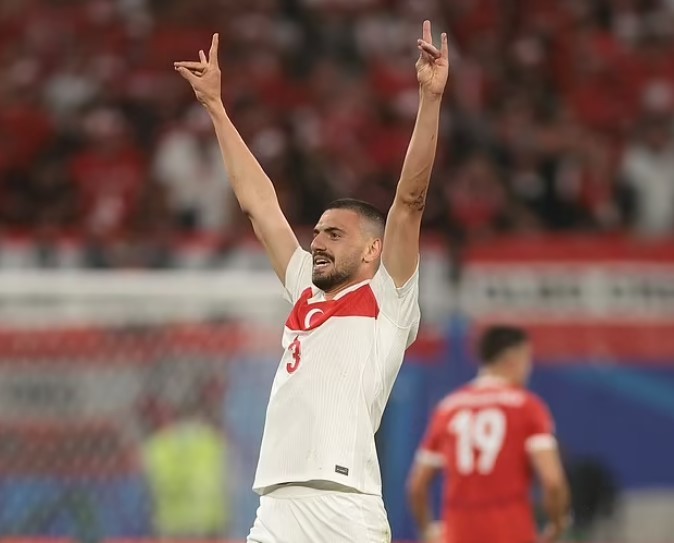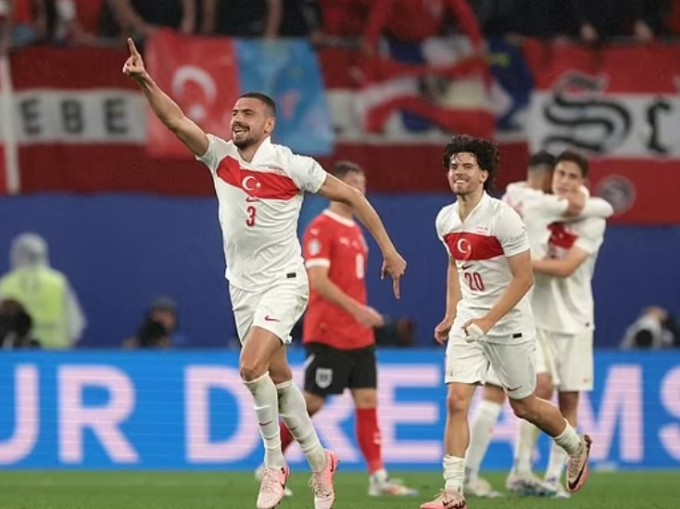Sport
Turkey's Merih Demiral faces calls for UEFA ban over Gesture
Turkey Defender Merih Demiral Faces UEFA Probe Over Alleged Far-Right Gesture During Euro 2024 Match Against Austria.

Turkey's Euro 2024 campaign took a controversial turn as defender Merih Demiral came under scrutiny for his celebration gesture after scoring twice in their 2-1 victory over Austria in the last-16 match. The 26-year-old's alleged performance of a 'Wolf's Salute', associated with the far-right extremist group Grey Wolves, has sparked a formal investigation by UEFA, casting a shadow over his stellar performance on the field.
The Controversial Celebration
Merih Demiral's pivotal role in Turkey's triumph over Austria was overshadowed by his celebratory gesture, which has raised serious concerns. The 'Wolf's Salute', resembling a raised hand with three fingers extended, is closely linked to the Grey Wolves, the youth movement of Turkey's Nationalist Movement Party (MHP). Known for its far-right ideologies, the Grey Wolves have been deemed extremist by several international bodies, including Germany's Constitutional Protection Agency and the European Union.
Legal Ramifications and Political Context
In Austria, where the match was held, the gesture is explicitly banned under laws prohibiting symbols associated with extremist organizations. Introduced in 2019, this legislation imposes fines of up to €4,000 for those found guilty of displaying such symbols. The controversy surrounding the gesture extends beyond Austria, as it is also prohibited in France and has drawn criticism internationally for its divisive political connotations.

Turkey's response to the allegations has been defensive, with Demiral himself explaining the gesture as a display of pride in his Turkish identity. He emphasized that his intention was not to promote extremism but rather to connect with Turkish fans who were also seen making the gesture in the stands. Despite his explanation, the incident has ignited a debate over the boundaries between cultural expression and political symbolism in sports.
International Reactions and Calls for Action
The controversy has prompted reactions from political figures and football authorities across Europe. Germany's Minister of Interior and Home Affairs, Nancy Faeser, condemned the gesture as inappropriate and called on UEFA to take decisive action against Demiral. Her statements underscored the broader concern over using sports events as platforms for political statements or divisive symbols.
Latest News
Turkey Defender Merih Demiral Faces UEFA Probe Over Alleged Far-Right Gesture During Euro 2024 Match Against Austria.

Turkey's Euro 2024 campaign took a controversial turn as defender Merih Demiral came under scrutiny for his celebration gesture after scoring twice in their 2-1 victory over Austria in the last-16 match. The 26-year-old's alleged performance of a 'Wolf's Salute', associated with the far-right extremist group Grey Wolves, has sparked a formal investigation by UEFA, casting a shadow over his stellar performance on the field.
The Controversial Celebration
Merih Demiral's pivotal role in Turkey's triumph over Austria was overshadowed by his celebratory gesture, which has raised serious concerns. The 'Wolf's Salute', resembling a raised hand with three fingers extended, is closely linked to the Grey Wolves, the youth movement of Turkey's Nationalist Movement Party (MHP). Known for its far-right ideologies, the Grey Wolves have been deemed extremist by several international bodies, including Germany's Constitutional Protection Agency and the European Union.
Legal Ramifications and Political Context
In Austria, where the match was held, the gesture is explicitly banned under laws prohibiting symbols associated with extremist organizations. Introduced in 2019, this legislation imposes fines of up to €4,000 for those found guilty of displaying such symbols. The controversy surrounding the gesture extends beyond Austria, as it is also prohibited in France and has drawn criticism internationally for its divisive political connotations.

Turkey's response to the allegations has been defensive, with Demiral himself explaining the gesture as a display of pride in his Turkish identity. He emphasized that his intention was not to promote extremism but rather to connect with Turkish fans who were also seen making the gesture in the stands. Despite his explanation, the incident has ignited a debate over the boundaries between cultural expression and political symbolism in sports.
International Reactions and Calls for Action
The controversy has prompted reactions from political figures and football authorities across Europe. Germany's Minister of Interior and Home Affairs, Nancy Faeser, condemned the gesture as inappropriate and called on UEFA to take decisive action against Demiral. Her statements underscored the broader concern over using sports events as platforms for political statements or divisive symbols.

Jennifer Lopez looks ageless in a towel in no-makeup video

Amanda Holden spanks her derriere and thanks Spanx

Amanda Holden shows off more than bargained as she dances around in her outfit of the day

Meet Harley Cameron, the stunning model who went from a BKFC ring girl to become a pro wrestler and found love

GreenGirlBella, Rocks Emirates Stadium in Painted Home Kit

Amanda Holden calls herself a 'good girl' in white dress with 'cheeky' split

Mum slammed by parents after flashing thong in school run outfit

Lottie Moss makes jaws dropp as she shows off her flawless body

Amanda Holden wears nothing beneath plunging white dress












Comments
Written news comments are in no way https://www.showbizglow.com it does not reflect the opinions and thoughts of. Comments are binding on the person who wrote them.